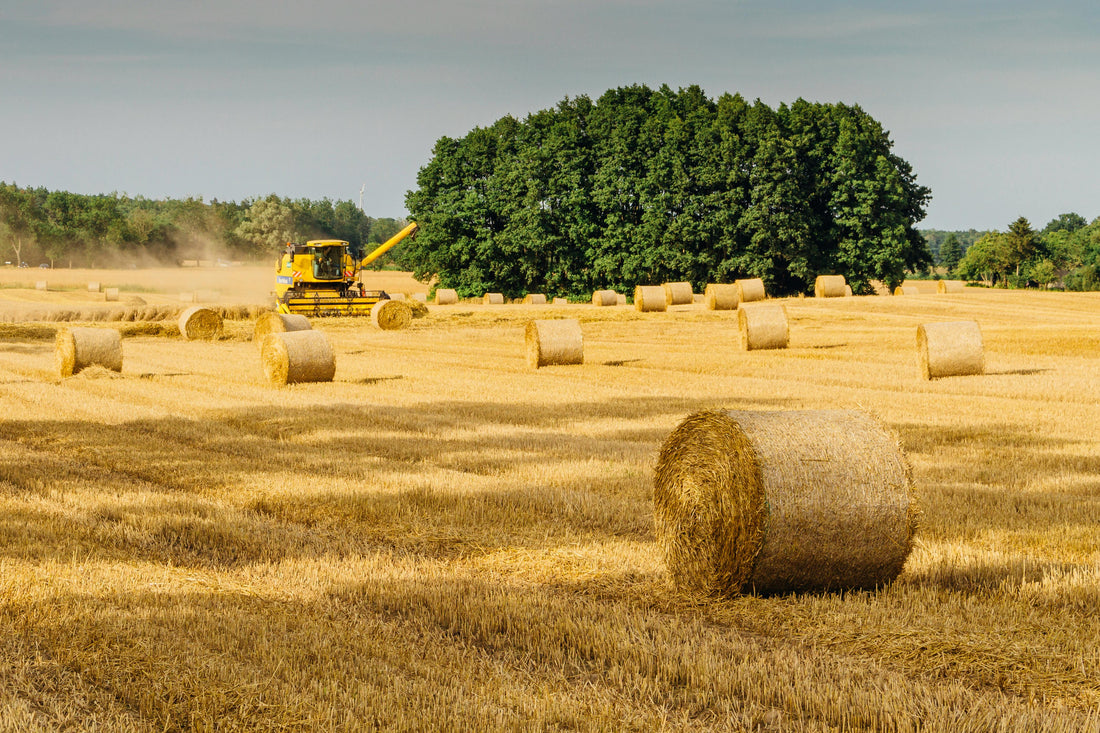Article Summary:
- Organic fertilizers improve soil health by enhancing soil structure, increasing moisture retention, and promoting beneficial microbial activity, which collectively support healthier and more robust crop growth.
- These fertilizers provide a balanced mix of essential nutrients, leading to optimal crop yields and reducing the risk of nutrient imbalances that are often associated with synthetic fertilizers.
- The use of organic fertilizers contributes to sustainable agriculture by reducing soil erosion, improving soil fertility, and creating a resilient growing environment that minimizes the need for chemical pesticides.
The debate around organic farming often centers on the types of inputs allowed, especially fertilizers. Many consumers are curious about how organic farmers nourish their crops and whether any fertilizers are used. Organic farming emphasizes sustainability, ecological balance, and minimal use of synthetic substances, but that doesn’t mean fertilizers are completely off-limits. This article explores the role of fertilizers in organic farming, detailing the types that are permitted, the regulations that guide their use, and their impact on soil health and crop yield. Understanding these aspects is crucial for appreciating the practices and benefits of organic agriculture.
Understanding organic farming principles
Organic farming principles revolve around sustainability, environmental stewardship, and the health of ecosystems. This approach prioritizes natural processes and cycles, aiming to work with nature rather than against it. One key principle is maintaining and enhancing soil fertility through the use of organic matter, crop rotations, and cover crops. These practices help improve soil structure, promote biodiversity, and reduce erosion. Additionally, organic farming avoids synthetic pesticides and fertilizers, relying instead on natural alternatives and integrated pest management to control pests and diseases.
Another core principle of organic farming is the promotion of biodiversity. By encouraging a variety of plants, animals, and microorganisms, organic farmers create resilient ecosystems that can withstand pests and diseases more effectively. This biodiversity also helps maintain a balance between different species, reducing the need for chemical interventions. Organic farming also emphasizes animal welfare, ensuring that livestock are raised in conditions that allow for natural behaviors and provide adequate space, fresh air, and access to the outdoors.

Shop 250g Organic Brazil Coffee at Orchard Food
Organic farming is guided by strict regulations and certification standards, which vary by country but generally adhere to the principles outlined by organizations such as the International Federation of Organic Agriculture Movements (IFOAM). These standards ensure that organic products meet specific criteria for environmental sustainability and health benefits. Compliance with these regulations is monitored through regular inspections and audits, providing consumers with assurance that they are purchasing truly organic products.
Overall, the principles of organic farming aim to create a sustainable, ecologically balanced agricultural system that produces healthy food while preserving the environment. By understanding and adhering to these principles, organic farmers contribute to a more sustainable future, ensuring that agricultural practices can continue to support both human and environmental health for generations to come.
Types of fertilizers permitted in organic farming
In organic farming, the use of fertilizers is strictly regulated to ensure that they align with the principles of sustainability and environmental health. Organic farmers are permitted to use a variety of natural and minimally processed fertilizers that contribute to soil fertility without harming the ecosystem.
One commonly used type of fertilizer in organic farming is compost. Compost is created by decomposing organic matter, such as food scraps, yard waste, and manure, into a rich soil amendment. This process recycles nutrients back into the soil, improving its structure, water retention, and microbial activity. Compost not only provides essential nutrients to plants but also helps sequester carbon, reducing greenhouse gas emissions.
Another important fertilizer in organic farming is animal manure. Manure from animals such as cows, chickens, and horses is a valuable source of nitrogen, phosphorus, and potassium. It must be properly composted or aged to eliminate pathogens before application to fields. Manure adds organic matter to the soil, enhancing its fertility and promoting healthy plant growth.
Green manure, or cover crops, is also widely used in organic farming. These are crops grown specifically to be turned back into the soil, where they decompose and release nutrients. Leguminous cover crops, such as clover and alfalfa, are particularly beneficial because they can fix atmospheric nitrogen into the soil, reducing the need for additional nitrogen fertilizers. Cover crops also help prevent soil erosion, improve soil structure, and suppress weeds.
Rock minerals, such as rock phosphate and greensand, are another category of fertilizers allowed in organic farming. These minerals provide essential nutrients like phosphorus and potassium in a slow-release form, ensuring that plants receive a steady supply of nutrients over time. Rock minerals also help to improve soil pH and enhance its overall fertility.
Lastly, seaweed and fish-based fertilizers are permitted in organic farming. Seaweed extracts and fish emulsions are rich in trace minerals, vitamins, and amino acids that boost plant health and growth. These fertilizers promote root development, enhance disease resistance, and improve the overall vitality of crops. They are often used as foliage sprays or soil drenches to provide immediate nutrient availability.
By using these types of fertilizers, organic farmers maintain soil health and fertility in a sustainable and environmentally friendly manner. These natural fertilizers support the organic farming principles of working with nature, recycling nutrients, and promoting biodiversity.
Natural vs. synthetic fertilizers
Natural and synthetic fertilizers differ significantly in their composition, environmental impact, and suitability for various farming practices. Natural fertilizers, derived from organic sources, such as compost, animal manure, and bone meal, are minimally processed and provide a range of essential nutrients in a slow-release form. They improve soil structure, enhance microbial activity, and contribute to long-term soil health. By fostering a diverse and active soil ecosystem, natural fertilizers help plants absorb nutrients more effectively, leading to robust growth and increased resilience to pests and diseases. Additionally, they promote sustainable agricultural practices by recycling organic waste and reducing the need for chemical inputs.
In contrast, synthetic fertilizers are manufactured from inorganic materials and designed to provide specific nutrients, such as nitrogen, phosphorus, and potassium, in concentrated and readily available forms. These fertilizers are highly efficient and can lead to immediate improvements in crop yields. However, their use often comes with significant environmental drawbacks. Synthetic fertilizers can lead to soil degradation, water pollution, and greenhouse gas emissions. Over-reliance on these fertilizers can diminish soil fertility over time, as they do not contribute to the organic matter necessary for healthy soil structure. Furthermore, runoff from synthetic fertilizers can contaminate waterways, leading to issues such as eutrophication and harm to aquatic ecosystems.
Organic farming practices typically emphasize the use of natural fertilizers due to their alignment with principles of sustainability and environmental stewardship. Natural fertilizers enhance soil fertility without the adverse effects associated with synthetic options. They also support biodiversity and the long-term health of the farming ecosystem. However, natural fertilizers can be less predictable in nutrient content and slower to act, requiring careful management and planning by farmers to meet crop needs effectively.

Shop 1kg Pasture Raised Durmsticks at Orchard Food
In conventional farming, synthetic fertilizers are often favored for their immediate impact and precise nutrient delivery, which can be crucial for large-scale crop production. These fertilizers enable farmers to achieve high yields and meet the demands of the global food supply. However, the environmental and long-term soil health costs associated with their use have led to increasing interest in more sustainable and integrated approaches, blending both natural and synthetic methods to optimize productivity while minimizing harm.
Ultimately, the choice between natural and synthetic fertilizers depends on the specific goals, practices, and values of the farming operation. Organic farming mandates the exclusive use of natural fertilizers, prioritizing ecological balance and soil health. Conventional farming may incorporate both types, aiming to maximize efficiency and yield. As awareness of environmental issues grows, there is a greater push towards sustainable practices that reduce reliance on synthetic inputs and enhance the natural fertility of the soil.
Regulations governing fertilizer use in organic agriculture
In South Africa, the use of fertilizers in organic agriculture is governed by strict regulations designed to ensure that organic farming practices adhere to principles of sustainability, environmental protection, and soil health. The primary regulatory framework guiding organic farming in South Africa includes standards set by international bodies, such as the International Federation of Organic Agriculture Movements (IFOAM), and local regulations under the South African Organic Sector Organization (SAOSA). These regulations stipulate that organic farmers must use natural fertilizers, which are derived from plant, animal, or mineral sources and are minimally processed.
The regulations emphasize the importance of maintaining soil fertility through organic matter and nutrient recycling. This means that organic farmers are encouraged to use compost, green manure, animal manure, and other organic soil amendments that contribute to the overall health and biodiversity of the soil. The use of synthetic fertilizers, which are often associated with negative environmental impacts such as soil degradation and water pollution, is strictly prohibited in organic farming. This aligns with the broader goals of organic agriculture to promote ecological balance and reduce reliance on chemical inputs.
Moreover, the regulations require that all natural fertilizers used in organic farming must be free from contaminants and synthetic additives. This ensures that the fertilizers do not introduce harmful substances into the soil or the food produced. Organic farmers must also keep detailed records of the fertilizers they use, including their sources and application rates, to maintain transparency and traceability. These records are subject to inspection by certification bodies, which verify compliance with organic standards.
In addition to these requirements, the regulations encourage the use of practices that enhance soil health naturally, such as crop rotation, cover cropping, and the integration of livestock. These practices help to maintain a balanced ecosystem within the farm, improve soil structure, and enhance nutrient availability. By following these guidelines, organic farmers in South Africa contribute to the sustainability of the agricultural system and the production of healthy, nutritious food.
Overall, the regulations governing fertilizer use in organic agriculture in South Africa reflect a commitment to sustainable farming practices. They ensure that organic farmers use fertilizers that support soil health and environmental protection, aligning with the global principles of organic farming. By adhering to these regulations, South African organic farmers help to promote a more sustainable and resilient agricultural system.
Impact of organic fertilizers on soil health and crop yield
Organic fertilizers have a significant impact on soil health and crop yield, playing a crucial role in sustainable agriculture. These fertilizers, derived from natural sources such as compost, animal manure, green manure, and bone meal, contribute to the overall improvement of soil structure and fertility. By enhancing the organic matter content in the soil, organic fertilizers promote the growth of beneficial microorganisms and earthworms, which are essential for soil health. These microorganisms help decompose organic matter, releasing nutrients slowly and steadily, which are then available for plant uptake. This slow release of nutrients ensures that plants receive a consistent supply of essential elements throughout their growth cycle, leading to healthier and more robust crops.
In terms of soil health, organic fertilizers improve soil aeration and water-holding capacity. The addition of organic matter increases the soil’s ability to retain moisture, reducing the need for frequent irrigation and making crops more resilient to drought conditions. Improved soil structure also facilitates better root penetration, allowing plants to access nutrients more efficiently. Furthermore, the use of organic fertilizers reduces soil erosion and compaction, maintaining the soil’s physical properties and preventing the loss of topsoil, which is rich in nutrients. This preservation of soil health is critical for long-term agricultural productivity and environmental sustainability.
Organic fertilizers also enhance the soil’s nutrient profile by supplying essential macro and micronutrients. Unlike synthetic fertilizers, which often focus on a few key nutrients, organic fertilizers provide a balanced mix of nitrogen, phosphorus, potassium, and trace elements that are vital for plant growth. This balanced nutrient supply helps in achieving optimal crop yields without the risk of nutrient imbalances that can occur with the use of synthetic fertilizers. Additionally, organic fertilizers improve the soil’s cation exchange capacity, enabling it to hold onto nutrients more effectively and make them available to plants when needed.
The impact of organic fertilizers on crop yield is generally positive, although the results can vary depending on the type of crop and local soil conditions. Many studies have shown that organic farming systems can produce yields comparable to conventional systems, especially over the long term. The improved soil health and nutrient availability provided by organic fertilizers contribute to this yield stability. Furthermore, crops grown with organic fertilizers often exhibit greater resilience to pests and diseases, reducing the need for chemical pesticides and promoting a healthier growing environment. This resilience is partly due to the enhanced microbial activity in the soil, which can suppress soil-borne pathogens and improve plant health.
In conclusion, the use of organic fertilizers has a profound and beneficial impact on both soil health and crop yield. By improving soil structure, moisture retention, and nutrient availability, organic fertilizers create a more sustainable and productive agricultural system. They support healthy crop growth and yield, while also promoting environmental stewardship by reducing reliance on synthetic inputs and enhancing the natural fertility of the soil. As more farmers adopt organic practices, the benefits of organic fertilizers will continue to contribute to the long-term viability and sustainability of agriculture.










